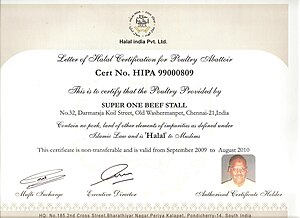Halal/ja: Difference between revisions
Created page with "* Category:Food law Category:Islamic terminology Category:Ritual slaughter Category:Ritual purity in Islam {{二次利用/ja|date=19 August 2025, at 20:50}}" |
Created page with "=== パーソナルケア === 女性用衛生用品やおむつはマレーシアでハラール認証を受けている。このような認証は宗教によって要求されているわけではなく、ムスリムからの需要も存在しない。批評家は、このような「不必要な」認証を、例えば明らかにベジタリアンである清涼飲料水や、シリアル、豆類、野菜、野菜製品のみで作られた..." |
||
| (34 intermediate revisions by the same user not shown) | |||
| Line 1: | Line 1: | ||
<languages /> | <languages /> | ||
[[File:Halal logo.svg|thumb|right|''ハラール''という言葉。イスラム教徒にとって、レストラン、店、製品における視覚的マーカーとして使われる。|263x263px]] | |||
[[File:Halal logo.svg|thumb|right| | |||
{{Usul al-fiqh}} | {{Usul al-fiqh}} | ||
''''' | '''''ハラール'''''([[:wikt:حلال|حلال]])は、アラビア語で「許された」を意味する言葉である。この用語は、[[:en:Islamic dietary laws|イスラム教の食に関する規定]]、特に[[:en:Islamic guidelines|イスラム式食肉処理]]に従って食肉処理された肉と関連付けられることが多いが、ビジネス、金融([[:en:Riba|高利貸し(リバ)の禁止]]など)、および日常生活における倫理的慣行も規定している。これには、公正、社会正義、動物の扱いなど、より広範な[[倫理]]的配慮が含まれる。''ハラール''の概念は、イスラム教の慣行の中心であり、クルアーンとスンナ(預言者ムハンマドの教えと慣行)に由来する。 | ||
[[:en:Quran|クルアーン]]において、ハラールという用語は[[:en:haram|ハラーム]]({{gloss|forbidden, unlawful}})という用語と対比されている。ハラールまたはハラームとされるものの指針は、イスラーム法学(''フィクフ'')に定められており、学者はイスラームの原則を順守するためにこれらの指針を解釈する。この[[:en:binary opposition|二項対立]]は、「[[:en:Ahkam|五つの規定]]」として知られる、より複雑な分類に発展した。: [[:en:Fard|義務]]、[[:en:Mustahabb|推奨]]、[[:en:Mubah|中立]]、[[:en:Makruh|嫌悪]]、[[:en:Haram|禁止]]である。 [[:en:Faqīh|イスラーム法学者]]の間では、ハラールという用語がこれら5つの分類のうち最初の2つを指すのか、あるいは最初の4つを指すのかについて意見が分かれている。近年、大衆を動員しようとするイスラーム運動や、一般大衆向けに執筆する著作家は、ハラールとハラームのより単純な区別を強調している。 | |||
現代社会において、ハラールの概念は個人の行動や食事制限を超え、特に食品、製薬、化粧品、金融分野における世界的な産業となっている。ハラール認証機関は、製品やサービスがムスリムが消費するために必要な基準を満たしていることを保証し、世界中の多くの企業が、特に世界のムスリム人口の増加に伴い、ハラール製品に対する需要の高まりに応えるためにハラール認証を求めている。ハラール製品やサービスに対する需要の増加は、特にマレーシア、インドネシア、中東など、ムスリム人口が多い国々において、ハラール経済の成長を促している。多くの非ムスリムが多数を占める国々もまた、自国のムスリム市民や世界の消費者のニーズを満たすために、ハラール市場に参入している。 | |||
== クルアーンにおいて == | |||
= | ''ハラール''と''ハラーム''という語は、合法または許容されるものと、非合法または禁止されるものの範疇を示すためにクルアーンで用いられる一般的な用語である。クルアーンにおいて、[[:en:Semitic root|語根]]''ḥ-l-l''は合法性を意味し、また巡礼者が儀礼的な状態から退出し、俗なる状態に入ることを示す場合もある。これら両義において、それは語根''ḥ-r-m''(cf. ''[[:en:haram|ハラーム]]''および[[:en:ihram|イフラーム]])によって伝えられる意味の反対を持つ。文字通りの意味では、語根ḥr-mは解消(例えば、誓いの破棄)や降臨(例えば、神の怒りの降臨)を指すことがある。合法性は通常、クルアーンにおいて、神を明示的または暗示的な主語として、動詞{{transliteration|ar|ahalla}}({{gloss|to make lawful}})によって示される。 | ||
== 食物 == | |||
{{main/ja|:en:Islamic dietary laws}} | |||
{{main|Islamic dietary laws}} | [[File:清真中國牛肉館.JPG|thumb|台湾・台北のレストランに掲げられた中国語のハラール表示({{lang|zh|清真}}, {{transliteration|zh|qīng zhēn}})]] | ||
[[File:清真中國牛肉館.JPG|thumb| | |||
イスラム教は、特定に[[:en:hadith|ハディース]]や[[:en:Qur'an|クルアーン]]において禁止されていない限り、すべての食物を一般的にハラールと見なす。具体的に、ハラール食品は以下の条件を満たすものである。 | |||
# 機械、設備、および/または器具を用いて製造、生産、加工、処理、保存され、それらがイスラム法([[:en:shariah|シャリーア]])に従って清浄化されていること。 | |||
# | # イスラム法に従ってムスリムが食べることを禁じられている成分を一切含まないこと。 | ||
# | |||
[[:en:haram|ハラーム]](非ハラール)食品の最も一般的な例は豚肉である。豚肉は、ムスリムが消費してはならない肉として唯一明確に分類されている(クルアーン第2章173節および第16章115節)。他の純粋ではない状態の食物もまたハラームと見なされる。非豚肉食品の基準には、その由来、動物の死因、加工方法が含まれる。イスラム教の学者の大多数は、貝類やその他の海産物をハラールと見なしている。[[Vegetarian cuisine/ja|ベジタリアン料理]]は、[[alcoholic drink/ja|アルコール]]を含まない限りハラールである。 | |||
ムスリムは、すべての食物(特に加工食品)だけでなく、[[:en:cosmetics|化粧品]]や[[pharmaceuticals/ja|医薬品]]のような非食物についても、それがハラールであることを確認しなければならない。これらの製品にはしばしば、動物由来の副産物や、ムスリムが体内に取り入れたり体に使用したりすることを許されない成分が含まれている。ムスリムが摂取することをハラールと見なされない食品には、血液や[[alcoholic beverage/ja|アルコール飲料]]などの陶酔性物質が含まれる。 | |||
ムスリムが他に食べるものがなく、飢え死にする場合には、非ハラール食品を食べることが許される。 | |||
いくつかの食品会社は、ハラール加工食品や製品を提供しており、その中にはハラールの[[foie gras/ja|フォアグラ]]、[[spring roll/ja|春巻き]]、[[chicken nugget/ja|チキンナゲット]]、[[ravioli/ja|ラビオリ]]、[[lasagna/ja|ラザニア]]、[[pizza/ja|ピザ]]、[[baby food/ja|ベビーフード]]が含まれる。ハラールの[[TV dinner/ja|冷凍調理済み食品]]は、イギリスやアメリカのムスリムにとって成長中の消費市場であり、販売業者の増加に伴って提供されている。 | |||
[[genetically modified crops/ja|遺伝子組み換え作物]](GMO食品)に関する意見は分かれているが、それを消費することを禁じる広く受け入れられた禁止は存在しない。一部の聖職者や学者は、GMO食品の生産方法は人間の福祉に寄与するためハラールであると主張し、支持を表明している。GMOに反対する声は、神がすべてを完全に創造したので、食用作物を遺伝子操作する必要はなく、人間は神が創造したものを操作する権利を持たないと主張する。他の者は、豚由来の遺伝子を用いて生産された特定のGMO食品を理論的に摂取することについて懸念を表明している。 | |||
=== ハラール肉 === | |||
=== | {{main/ja|Dhabihah/ja}} | ||
{{main|Dhabihah}} | [[File:HalalMeat.jpg|thumb|[[:en:Canada|カナダ]]・[[:en:Ontario|オンタリオ州]]・[[:en:Richmond Hill, Ontario|リッチモンドヒル]]の食料品店にあるハラール肉コーナー]] | ||
[[File:HalalMeat.jpg|thumb| | ムスリムは、動物の倫理的な扱いを信じている。ハラールの実践は、この理念に沿っており、動物の生涯全体にわたって優しさ、思いやり、人道的な扱いを推進するものである。迅速で苦痛の少ない屠殺を強調することは、動物の尊厳を尊重し、苦痛を最小限に抑える。 | ||
ハラール肉は、ハラールの方法を用いる供給者から得られなければならない。[[:en:Dhabihah|ダビー ハ]]({{lang|ar|ذَبِيْحَة}})は、イスラム法に基づき、魚類やその他の海洋生物を除くすべての肉源に対して規定された屠殺方法である。この[[:en:Animal slaughter|屠殺方法]]は、鋭利なナイフを用いて[[throat/ja|喉]]、[[Esophagus/ja|食道]]、[[jugular vein/ja|頸静脈]]を切開するが、[[spinal cord/ja|脊髄]]は切断しないものである。ハラールの方法で屠殺される動物の頭部は、礼拝時にムスリムが向かう方向である[[:en:qiblah|キブラ]]に合わせられるべきである。この方向に加え、許された動物は「[[:en:Basmala|ビスミッラー]]、アッラーフ・アクバル」(神の御名において、神は偉大なり)というイスラムの祈りを唱えながら屠殺されなければならない。 | |||
屠殺はムスリムによって行われなければならない。[[Carrion/ja|死肉]](野生で死んだ動物の死骸など)は食べることができない。さらに、絞殺された動物、殴打されて(死に至った)動物、落下によって殺された動物、角で突かれて(死に至った)動物、猛獣に襲われた動物(ただし人間によって止めが刺されなかった場合)、石の祭壇で犠牲にされた動物は食べることができない。 | |||
==== 他宗教との適合性 ==== | |||
=== | {{main/ja|:en:Comparison of Islamic and Jewish dietary laws|:en:Christian dietary laws|Diet in Sikhism/ja}} | ||
{{main|Comparison of Islamic and Jewish dietary laws|Christian dietary laws|Diet in Sikhism}} | [[:en:People of the Book|啓典の民]]([[:en:Jews|ユダヤ人]]および[[:en:Christians|キリスト教徒]])によって屠殺された動物も、頸静脈を切開し、血を抜き、アッラーの名が唱えられた場合にはハラールと見なすことができる。その結果、一部のムスリム共同体では[[:en:kosher|コーシャ]]肉が許容され、時にはハラール肉の代替として用いられる。 | ||
[[:en:Sikhism|シク教]]では、宗教的儀式を伴ってゆっくりと[[Kutha meat/ja|屠殺]]された動物の肉(''クタ肉'')を食べることを禁じている。これにはハラール肉の調理も含まれる。シク教徒の間で宗教的に推奨される屠殺方法は[[:en:jhatka|ジャトカ]]として知られ、肉からすべての血液が抜かれないため、ハラールの原則とは両立しない。 | |||
[[Sikhism]] | |||
==== 動物福祉に関する懸念 ==== | |||
=== | [[File:Jordan 2021 P355 Amman Butcher's shop.jpg|thumb|200px|ヨルダン・[[:en:Amman|アンマン]]の精肉店]] | ||
[[File:Jordan 2021 P355 Amman Butcher's shop.jpg|thumb|200px| | [[File:Eidpakistan.jpg|thumb|200px|[[:en:Eid al-Adha|イード・アル=アドハー]]におけるパキスタンでの肉の分配]] | ||
[[File:Eidpakistan.jpg|thumb|200px|[[Eid al-Adha]] | 動物の[[:en:Stunning|気絶処理]]は、暴れる動物を落ち着かせるために必要な場合にのみ許される。イギリスのスーパーマーケットは、ハラール肉に対して屠殺前に気絶処理を行うと報告している。2011年の[[:en:UK Food Standards Agency|イギリス食品基準庁]]の統計によれば、ハラール肉として屠殺された牛の84%、羊の81%、鶏の88%が死ぬ前に気絶処理を受けていた。[[:en:Tesco|テスコ]]は「同社が販売するハラール肉と他の肉の唯一の違いは、(動物が)屠殺される際に祈りが唱えられたことである」と述べている。 | ||
[[Stunning]] | |||
事前の気絶処理なしの屠殺による動物の苦痛に関する懸念から、[[:en:Denmark|デンマーク]]、[[:en:Luxembourg|ルクセンブルク]]、[[:en:Belgium|ベルギー]]、[[:en:Netherlands|オランダ]]、[[:en:Norway|ノルウェー]]、[[:en:Sweden|スウェーデン]]、[[:en:Switzerland|スイス]]では、気絶させていない動物の屠殺が禁止されている。 | |||
=== 認証 === | |||
[[File:HalalIndiaCertificate.jpg|thumb|インドのハラール認証の一例]] | |||
[[File:HalalIndiaCertificate.jpg|thumb| | |||
ハラール製品の認証は、ほとんどの[[:en:Muslim world|イスラム教徒多数国]]において法的機関によって与えられるが、その他の国々では企業が自主的に取得し、非政府組織が年会費を取って発行している。 | |||
==== アメリカ合衆国におけるハラール認証 ==== | |||
==== | アメリカ合衆国では、複数の機関がハラール認証を提供している。国内利用か国際輸出かによって、認証は資格を持つ団体によって行われる必要がある。国内利用の場合、適切な知識、訓練、背景を持つ地元機関がハラール認証を発行できる。輸出に使用する場合には、輸出先の国によって認定されたハラール認証機関でなければならない。製品を認証する必要がある企業は、認証機関を雇う際に十分な調査を行わなければならない。アメリカ合衆国に存在するハラール認証機関には、ISWA Halal、ISA Halal、[[:en:Oakland, California|シカゴ]]に拠点を置くHalal Monitoring Services(HMS)、[[:en:Chicago|カリフォルニア州オークランド]]に拠点を置くHalal Food Standards Alliance of America(HFSAA)、[[:en:New York (state)|ニューヨーク州]]に拠点を置く[https://halalwatch.us/ Halal Watch World]などがある。また、企業が適切なハラール認証機関を特定・選定するのを支援する機関として、バージニア州フェアファックスに拠点を置く[https://halalexpousa.com/ushc/ US Halal Consultants]がある。 | ||
==== 批判 ==== | |||
= | オーストラリアでは、[[:en:Halal certification in Australia|ハラール食品認証]]は、ハラールとして食品を認証することが消費者による特定の宗教的信念への補助につながると主張する団体から批判を受けてきた。[[Wikipedia:Keysar Trad|Keysar Trad]]、[[:en:Australian Federation of Islamic Councils|オーストラリア・イスラム評議会連盟]]の報道官は、2014年7月にジャーナリストに対し、これは[[:en:Islamophobia in Australia|オーストラリアにおける反イスラム感情]]を利用する試みであると述べた。2022年の調査では、ハラール認証が必ずしも製品が完全にハラールである程度を反映していないことが示され、より強固な保証手段と透明な質的認証方法の必要性が提起された。 | ||
=== ビジネス === | |||
== | [[:en:Dubai Chamber of Commerce and Industry|ドバイ商工会議所]]は、2013年における世界のハラール食品消費購入額を1.1兆ドルと推定しており、これは世界の食品・飲料市場の16.6%を占め、年間6.9%の成長を遂げている。成長地域には、[[:en:Indonesia|インドネシア]](2012年時点で1億9700万ドルの市場価値)や[[:en:Turkey|トルコ]](1億ドル)が含まれる。[[:en:European Union|欧州連合]]のハラール食品市場は、年間約15%の成長が見込まれ、推定300億ドル規模であり、そのうち約80億ドルはフランスにおいて占められている。 | ||
ハラール食品・飲料産業はまた、スーパーマーケットやレストランなどの他の食品ビジネスにも大きな影響を与えている。フランスのスーパーマーケットにおけるハラール食品の売上は2011年に2億1000万ドルに達し、5年前から10.5%成長した。フランスにおけるハラール食品市場は、他の一般的な食品市場よりもさらに大きい。例えば、2010年のフランスにおけるハラール食品・飲料市場は、有機食品市場のほぼ2倍であった。フランスの大手スーパーマーケットチェーンである[[:en:Auchan|オーシャン]]は、現在80種類の認証ハラール肉製品、30種類の調理済みハラール食品、40種類の冷凍ハラール製品を販売している。高級レストランやケータリングサービスも、メニューにハラール食品を加えている。さらに、[[:en:Evian|エビアン]]のような多くの飲料会社は、自社の水やその他の飲料が純粋であり、イスラム法においてハラーム(禁止)ではないことを示すためにハラール認証印を製品に加える努力をしている。 | |||
=== 国際規制との相互作用 === | |||
=== | ハラール基準および規制は、国際貿易における障害と見なされており、輸入製品に対する差別も透明性を欠いている。ハラールに関連する貿易紛争は、ムスリム諸国やイスラム諸国の間でも発生しており、例えばASEAN域内の地域レベルでも起きている。 | ||
==== 欧州連合 ==== | |||
==== | 2020年12月17日、[[:en:Court of Justice of the European Union|欧州連合司法裁判所]]は、加盟国は[[:en:animal welfare|動物福祉]]を促進するために宗教的屠殺を禁止でき、動物を殺す前に非致死的な気絶処理を課すことができると裁定した。この裁定は、2017年にフランデレン政府が非致死的(可逆的とも呼ばれる)な事前気絶処理なしでの動物屠殺を禁止したことに対し、ユダヤ人およびムスリム団体が異議を申し立てたことに応じたものである。 | ||
==== インド ==== | |||
==== | {{Main/ja|:en:Hindu–Islamic relations#Foods}} | ||
{{Main|Hindu–Islamic relations#Foods}} | ムスリム共同体は、ハラール食品とその認証を受け入れてきた。インドの右翼系[[:en:Hindutva|ヒンドゥートヴァ]]団体のメンバーは、インドにおけるハラール食品の販売に抗議してきた。[[:en:Bajrang Dal|バジャラング・ダル]]、[[:en:Vishva Hindu Parishad|ヴィシュヴァ・ヒンドゥー・パリシャド]]などのヒンドゥートヴァ団体は、[[:en:Karnataka|カルナータカ州]]で戸別訪問キャンペーンを行い、人々にハラール肉を購入しないよう呼びかけた。2022年3月、ヒンドゥートヴァ団体バジャラング・ダルがムスリムの肉販売業者を物理的に攻撃し、この事件で5人が逮捕された。2022年3月、与党インド人民党の全国幹事である[[Wikipedia:C. T. Ravi|C. T. Ravi]]は、ハラール食品を「経済ジハード」と呼んだ。 | ||
==== イギリス ==== | |||
==== | {{As of|August 2012}}、イギリスでは推定27の[[:en:Tesco|テスコ]]スーパーマーケットに加え、ほとんどの都市部の[[:en:Asda|アズダ]]や多くの[[:en:Morrisons|モリソンズ]]のスーパーマーケットにハラール肉カウンターがあり、ムスリムが消費することを許された肉を販売していた。2017年9月に発表された食品基準庁の「Animal Welfare Update」報告によると、ハラール方式で屠殺された動物の16%は屠殺前に気絶処理を受けておらず、これは動物福祉に関する[[Wikipedia:RSPCA|RSPCA]]の基準に違反している。しかし、ユダヤ人およびムスリムに与えられた法律上の特例により、イギリスでは合法とされている。 | ||
{{As of|August 2012}} | |||
== 非食品分野での応用 == | |||
== | {{main/ja|:en:Halal tourism|:en:Islamic banking and finance}} | ||
{{main|Halal tourism|Islamic banking and finance}} | 食物や食事に加えて、ハラールなライフスタイルには[[:en:Halal tourism|旅行]]、[[:en:Islamic banking and finance|金融]]、衣服、メディア、娯楽、化粧品などが含まれる。ハラールなライフスタイルは、産業や製造業の物流から供給網に至るまで、専門的な実践にも及ぶことがある。 | ||
=== 医薬品 === | |||
== | 一部のムスリムは、ハラールでない医薬品の使用を控える。この区別は特に[[:en:Malaysis|マレーシア]]で顕著に見られ、そこでは大規模なハラール医薬品産業が存在し、製品が{{transliteration|ar|tayyib}}であることを確保する政府規制が整備されている。一方で、クルアーンは、治療者の信仰にかかわらず、ムスリムに対し病気の治療、予防を含む治療を受けることを義務づけている。特に、[[gelatin/ja|ゼラチン]]など動物由来成分を含む薬は、1995年のイスラム法学者評議会により許容可能とされたため、この区別は不要とされている。イスラムの分権的な性質により、両方の見解が併存している。 | ||
=== ワクチン === | |||
=== | {{see also/ja|:en:Vaccination and religion}} | ||
{{see also|Vaccination and religion}} | 医薬品を巡る論争は、一部のイスラム教徒多数国において小児ワクチン接種の拒否につながっているが、多くの宗教指導者はワクチン接種を明確に支持している。これはまた、[[COVID-19 vaccine/ja|新型コロナウイルスワクチン]]の展開においても懸念とされている。 | ||
=== パーソナルケア === | |||
[[Feminine hygiene/ja|女性用衛生用品]]やおむつはマレーシアでハラール認証を受けている。このような認証は宗教によって要求されているわけではなく、ムスリムからの需要も存在しない。批評家は、このような「不必要な」認証を、例えば明らかにベジタリアンである清涼飲料水や、シリアル、豆類、野菜、野菜製品のみで作られた加工食品のような自然食品に対するハラールラベルと同様に、単なるマーケティングの[[:en:gimmick|仕掛け]]にすぎないと見なしている。 | |||
[[Feminine hygiene]] | |||
== 関連項目 == | |||
{{Portal|Islam|Animals|Food}} | {{Portal|Islam|Animals|Food}} | ||
{{div col}} | {{div col}} | ||
* [[Islamic ethics]] | * [[:en:Islamic ethics|イスラム倫理]] | ||
* | * [[:en:Al-Jami'a|アル・ジャミヤ]] - [[:en:Shi'a|シーア派]]のイスラム教の聖典であり、すべてのハラールの詳細が記されている。 | ||
* | * [[:en:Istihlal|イスティラール]] | ||
* [[Halal certification in Australia]] | * [[:en:Halal certification in Australia|オーストラリアのハラール認証]] | ||
* [[Halal certification in Europe]] | * [[:en:Halal certification in Europe|ヨーロッパのハラール認証]] | ||
* [[Food and drink prohibitions]] | * [[Food and drink prohibitions/ja|食のタブー]] | ||
* [[Kashrut]] | * [[:en:Kashrut|カシュルート]](ユダヤ教食物律) | ||
* [[Christian dietary laws]] | * [[:en:Christian dietary laws|キリスト教の食物律]] | ||
* [[Scottish pork taboo]] | * [[:en:Scottish pork taboo|スコットランドの豚肉のタブー]] | ||
{{div col end}} | {{div col end}} | ||
== 参考文献 == | |||
* Yungman, Limor, "Food", in ''Muhammad in History, Thought, and Culture: An Encyclopedia of the Prophet of God'' (2 vols.), Edited by C. Fitzpatrick and A. Walker, Santa Barbara, ABC-CLIO, 2014, Vol I. | * Yungman, Limor, "Food", in ''Muhammad in History, Thought, and Culture: An Encyclopedia of the Prophet of God'' (2 vols.), Edited by C. Fitzpatrick and A. Walker, Santa Barbara, ABC-CLIO, 2014, Vol I. | ||
== 外部リンク == | == 外部リンク == | ||
Latest revision as of 08:58, 24 August 2025

ハラール(حلال)は、アラビア語で「許された」を意味する言葉である。この用語は、イスラム教の食に関する規定、特にイスラム式食肉処理に従って食肉処理された肉と関連付けられることが多いが、ビジネス、金融(高利貸し(リバ)の禁止など)、および日常生活における倫理的慣行も規定している。これには、公正、社会正義、動物の扱いなど、より広範な倫理的配慮が含まれる。ハラールの概念は、イスラム教の慣行の中心であり、クルアーンとスンナ(預言者ムハンマドの教えと慣行)に由来する。
クルアーンにおいて、ハラールという用語はハラーム('forbidden, unlawful')という用語と対比されている。ハラールまたはハラームとされるものの指針は、イスラーム法学(フィクフ)に定められており、学者はイスラームの原則を順守するためにこれらの指針を解釈する。この二項対立は、「五つの規定」として知られる、より複雑な分類に発展した。: 義務、推奨、中立、嫌悪、禁止である。 イスラーム法学者の間では、ハラールという用語がこれら5つの分類のうち最初の2つを指すのか、あるいは最初の4つを指すのかについて意見が分かれている。近年、大衆を動員しようとするイスラーム運動や、一般大衆向けに執筆する著作家は、ハラールとハラームのより単純な区別を強調している。
現代社会において、ハラールの概念は個人の行動や食事制限を超え、特に食品、製薬、化粧品、金融分野における世界的な産業となっている。ハラール認証機関は、製品やサービスがムスリムが消費するために必要な基準を満たしていることを保証し、世界中の多くの企業が、特に世界のムスリム人口の増加に伴い、ハラール製品に対する需要の高まりに応えるためにハラール認証を求めている。ハラール製品やサービスに対する需要の増加は、特にマレーシア、インドネシア、中東など、ムスリム人口が多い国々において、ハラール経済の成長を促している。多くの非ムスリムが多数を占める国々もまた、自国のムスリム市民や世界の消費者のニーズを満たすために、ハラール市場に参入している。
クルアーンにおいて
ハラールとハラームという語は、合法または許容されるものと、非合法または禁止されるものの範疇を示すためにクルアーンで用いられる一般的な用語である。クルアーンにおいて、語根ḥ-l-lは合法性を意味し、また巡礼者が儀礼的な状態から退出し、俗なる状態に入ることを示す場合もある。これら両義において、それは語根ḥ-r-m(cf. ハラームおよびイフラーム)によって伝えられる意味の反対を持つ。文字通りの意味では、語根ḥr-mは解消(例えば、誓いの破棄)や降臨(例えば、神の怒りの降臨)を指すことがある。合法性は通常、クルアーンにおいて、神を明示的または暗示的な主語として、動詞ahalla('to make lawful')によって示される。
食物

イスラム教は、特定にハディースやクルアーンにおいて禁止されていない限り、すべての食物を一般的にハラールと見なす。具体的に、ハラール食品は以下の条件を満たすものである。
- 機械、設備、および/または器具を用いて製造、生産、加工、処理、保存され、それらがイスラム法(シャリーア)に従って清浄化されていること。
- イスラム法に従ってムスリムが食べることを禁じられている成分を一切含まないこと。
ハラーム(非ハラール)食品の最も一般的な例は豚肉である。豚肉は、ムスリムが消費してはならない肉として唯一明確に分類されている(クルアーン第2章173節および第16章115節)。他の純粋ではない状態の食物もまたハラームと見なされる。非豚肉食品の基準には、その由来、動物の死因、加工方法が含まれる。イスラム教の学者の大多数は、貝類やその他の海産物をハラールと見なしている。ベジタリアン料理は、アルコールを含まない限りハラールである。
ムスリムは、すべての食物(特に加工食品)だけでなく、化粧品や医薬品のような非食物についても、それがハラールであることを確認しなければならない。これらの製品にはしばしば、動物由来の副産物や、ムスリムが体内に取り入れたり体に使用したりすることを許されない成分が含まれている。ムスリムが摂取することをハラールと見なされない食品には、血液やアルコール飲料などの陶酔性物質が含まれる。
ムスリムが他に食べるものがなく、飢え死にする場合には、非ハラール食品を食べることが許される。
いくつかの食品会社は、ハラール加工食品や製品を提供しており、その中にはハラールのフォアグラ、春巻き、チキンナゲット、ラビオリ、ラザニア、ピザ、ベビーフードが含まれる。ハラールの冷凍調理済み食品は、イギリスやアメリカのムスリムにとって成長中の消費市場であり、販売業者の増加に伴って提供されている。
遺伝子組み換え作物(GMO食品)に関する意見は分かれているが、それを消費することを禁じる広く受け入れられた禁止は存在しない。一部の聖職者や学者は、GMO食品の生産方法は人間の福祉に寄与するためハラールであると主張し、支持を表明している。GMOに反対する声は、神がすべてを完全に創造したので、食用作物を遺伝子操作する必要はなく、人間は神が創造したものを操作する権利を持たないと主張する。他の者は、豚由来の遺伝子を用いて生産された特定のGMO食品を理論的に摂取することについて懸念を表明している。
ハラール肉

ムスリムは、動物の倫理的な扱いを信じている。ハラールの実践は、この理念に沿っており、動物の生涯全体にわたって優しさ、思いやり、人道的な扱いを推進するものである。迅速で苦痛の少ない屠殺を強調することは、動物の尊厳を尊重し、苦痛を最小限に抑える。
ハラール肉は、ハラールの方法を用いる供給者から得られなければならない。ダビー ハ(ذَبِيْحَة)は、イスラム法に基づき、魚類やその他の海洋生物を除くすべての肉源に対して規定された屠殺方法である。この屠殺方法は、鋭利なナイフを用いて喉、食道、頸静脈を切開するが、脊髄は切断しないものである。ハラールの方法で屠殺される動物の頭部は、礼拝時にムスリムが向かう方向であるキブラに合わせられるべきである。この方向に加え、許された動物は「ビスミッラー、アッラーフ・アクバル」(神の御名において、神は偉大なり)というイスラムの祈りを唱えながら屠殺されなければならない。
屠殺はムスリムによって行われなければならない。死肉(野生で死んだ動物の死骸など)は食べることができない。さらに、絞殺された動物、殴打されて(死に至った)動物、落下によって殺された動物、角で突かれて(死に至った)動物、猛獣に襲われた動物(ただし人間によって止めが刺されなかった場合)、石の祭壇で犠牲にされた動物は食べることができない。
他宗教との適合性
啓典の民(ユダヤ人およびキリスト教徒)によって屠殺された動物も、頸静脈を切開し、血を抜き、アッラーの名が唱えられた場合にはハラールと見なすことができる。その結果、一部のムスリム共同体ではコーシャ肉が許容され、時にはハラール肉の代替として用いられる。
シク教では、宗教的儀式を伴ってゆっくりと屠殺された動物の肉(クタ肉)を食べることを禁じている。これにはハラール肉の調理も含まれる。シク教徒の間で宗教的に推奨される屠殺方法はジャトカとして知られ、肉からすべての血液が抜かれないため、ハラールの原則とは両立しない。
動物福祉に関する懸念


動物の気絶処理は、暴れる動物を落ち着かせるために必要な場合にのみ許される。イギリスのスーパーマーケットは、ハラール肉に対して屠殺前に気絶処理を行うと報告している。2011年のイギリス食品基準庁の統計によれば、ハラール肉として屠殺された牛の84%、羊の81%、鶏の88%が死ぬ前に気絶処理を受けていた。テスコは「同社が販売するハラール肉と他の肉の唯一の違いは、(動物が)屠殺される際に祈りが唱えられたことである」と述べている。
事前の気絶処理なしの屠殺による動物の苦痛に関する懸念から、デンマーク、ルクセンブルク、ベルギー、オランダ、ノルウェー、スウェーデン、スイスでは、気絶させていない動物の屠殺が禁止されている。
認証

ハラール製品の認証は、ほとんどのイスラム教徒多数国において法的機関によって与えられるが、その他の国々では企業が自主的に取得し、非政府組織が年会費を取って発行している。
アメリカ合衆国におけるハラール認証
アメリカ合衆国では、複数の機関がハラール認証を提供している。国内利用か国際輸出かによって、認証は資格を持つ団体によって行われる必要がある。国内利用の場合、適切な知識、訓練、背景を持つ地元機関がハラール認証を発行できる。輸出に使用する場合には、輸出先の国によって認定されたハラール認証機関でなければならない。製品を認証する必要がある企業は、認証機関を雇う際に十分な調査を行わなければならない。アメリカ合衆国に存在するハラール認証機関には、ISWA Halal、ISA Halal、シカゴに拠点を置くHalal Monitoring Services(HMS)、カリフォルニア州オークランドに拠点を置くHalal Food Standards Alliance of America(HFSAA)、ニューヨーク州に拠点を置くHalal Watch Worldなどがある。また、企業が適切なハラール認証機関を特定・選定するのを支援する機関として、バージニア州フェアファックスに拠点を置くUS Halal Consultantsがある。
批判
オーストラリアでは、ハラール食品認証は、ハラールとして食品を認証することが消費者による特定の宗教的信念への補助につながると主張する団体から批判を受けてきた。Keysar Trad、オーストラリア・イスラム評議会連盟の報道官は、2014年7月にジャーナリストに対し、これはオーストラリアにおける反イスラム感情を利用する試みであると述べた。2022年の調査では、ハラール認証が必ずしも製品が完全にハラールである程度を反映していないことが示され、より強固な保証手段と透明な質的認証方法の必要性が提起された。
ビジネス
ドバイ商工会議所は、2013年における世界のハラール食品消費購入額を1.1兆ドルと推定しており、これは世界の食品・飲料市場の16.6%を占め、年間6.9%の成長を遂げている。成長地域には、インドネシア(2012年時点で1億9700万ドルの市場価値)やトルコ(1億ドル)が含まれる。欧州連合のハラール食品市場は、年間約15%の成長が見込まれ、推定300億ドル規模であり、そのうち約80億ドルはフランスにおいて占められている。
ハラール食品・飲料産業はまた、スーパーマーケットやレストランなどの他の食品ビジネスにも大きな影響を与えている。フランスのスーパーマーケットにおけるハラール食品の売上は2011年に2億1000万ドルに達し、5年前から10.5%成長した。フランスにおけるハラール食品市場は、他の一般的な食品市場よりもさらに大きい。例えば、2010年のフランスにおけるハラール食品・飲料市場は、有機食品市場のほぼ2倍であった。フランスの大手スーパーマーケットチェーンであるオーシャンは、現在80種類の認証ハラール肉製品、30種類の調理済みハラール食品、40種類の冷凍ハラール製品を販売している。高級レストランやケータリングサービスも、メニューにハラール食品を加えている。さらに、エビアンのような多くの飲料会社は、自社の水やその他の飲料が純粋であり、イスラム法においてハラーム(禁止)ではないことを示すためにハラール認証印を製品に加える努力をしている。
国際規制との相互作用
ハラール基準および規制は、国際貿易における障害と見なされており、輸入製品に対する差別も透明性を欠いている。ハラールに関連する貿易紛争は、ムスリム諸国やイスラム諸国の間でも発生しており、例えばASEAN域内の地域レベルでも起きている。
欧州連合
2020年12月17日、欧州連合司法裁判所は、加盟国は動物福祉を促進するために宗教的屠殺を禁止でき、動物を殺す前に非致死的な気絶処理を課すことができると裁定した。この裁定は、2017年にフランデレン政府が非致死的(可逆的とも呼ばれる)な事前気絶処理なしでの動物屠殺を禁止したことに対し、ユダヤ人およびムスリム団体が異議を申し立てたことに応じたものである。
インド
ムスリム共同体は、ハラール食品とその認証を受け入れてきた。インドの右翼系ヒンドゥートヴァ団体のメンバーは、インドにおけるハラール食品の販売に抗議してきた。バジャラング・ダル、ヴィシュヴァ・ヒンドゥー・パリシャドなどのヒンドゥートヴァ団体は、カルナータカ州で戸別訪問キャンペーンを行い、人々にハラール肉を購入しないよう呼びかけた。2022年3月、ヒンドゥートヴァ団体バジャラング・ダルがムスリムの肉販売業者を物理的に攻撃し、この事件で5人が逮捕された。2022年3月、与党インド人民党の全国幹事であるC. T. Raviは、ハラール食品を「経済ジハード」と呼んだ。
イギリス
August 2012年現在[update]、イギリスでは推定27のテスコスーパーマーケットに加え、ほとんどの都市部のアズダや多くのモリソンズのスーパーマーケットにハラール肉カウンターがあり、ムスリムが消費することを許された肉を販売していた。2017年9月に発表された食品基準庁の「Animal Welfare Update」報告によると、ハラール方式で屠殺された動物の16%は屠殺前に気絶処理を受けておらず、これは動物福祉に関するRSPCAの基準に違反している。しかし、ユダヤ人およびムスリムに与えられた法律上の特例により、イギリスでは合法とされている。
非食品分野での応用
食物や食事に加えて、ハラールなライフスタイルには旅行、金融、衣服、メディア、娯楽、化粧品などが含まれる。ハラールなライフスタイルは、産業や製造業の物流から供給網に至るまで、専門的な実践にも及ぶことがある。
医薬品
一部のムスリムは、ハラールでない医薬品の使用を控える。この区別は特にマレーシアで顕著に見られ、そこでは大規模なハラール医薬品産業が存在し、製品がtayyibであることを確保する政府規制が整備されている。一方で、クルアーンは、治療者の信仰にかかわらず、ムスリムに対し病気の治療、予防を含む治療を受けることを義務づけている。特に、ゼラチンなど動物由来成分を含む薬は、1995年のイスラム法学者評議会により許容可能とされたため、この区別は不要とされている。イスラムの分権的な性質により、両方の見解が併存している。
ワクチン
医薬品を巡る論争は、一部のイスラム教徒多数国において小児ワクチン接種の拒否につながっているが、多くの宗教指導者はワクチン接種を明確に支持している。これはまた、新型コロナウイルスワクチンの展開においても懸念とされている。
パーソナルケア
女性用衛生用品やおむつはマレーシアでハラール認証を受けている。このような認証は宗教によって要求されているわけではなく、ムスリムからの需要も存在しない。批評家は、このような「不必要な」認証を、例えば明らかにベジタリアンである清涼飲料水や、シリアル、豆類、野菜、野菜製品のみで作られた加工食品のような自然食品に対するハラールラベルと同様に、単なるマーケティングの仕掛けにすぎないと見なしている。
関連項目
- イスラム倫理
- アル・ジャミヤ - シーア派のイスラム教の聖典であり、すべてのハラールの詳細が記されている。
- イスティラール
- オーストラリアのハラール認証
- ヨーロッパのハラール認証
- 食のタブー
- カシュルート(ユダヤ教食物律)
- キリスト教の食物律
- スコットランドの豚肉のタブー
参考文献
- Yungman, Limor, "Food", in Muhammad in History, Thought, and Culture: An Encyclopedia of the Prophet of God (2 vols.), Edited by C. Fitzpatrick and A. Walker, Santa Barbara, ABC-CLIO, 2014, Vol I.
外部リンク
| この記事は、クリエイティブ・コモンズ・表示・継承ライセンス3.0のもとで公表されたウィキペディアの項目Halal(19 August 2025, at 20:50編集記事参照)を翻訳して二次利用しています。 |
